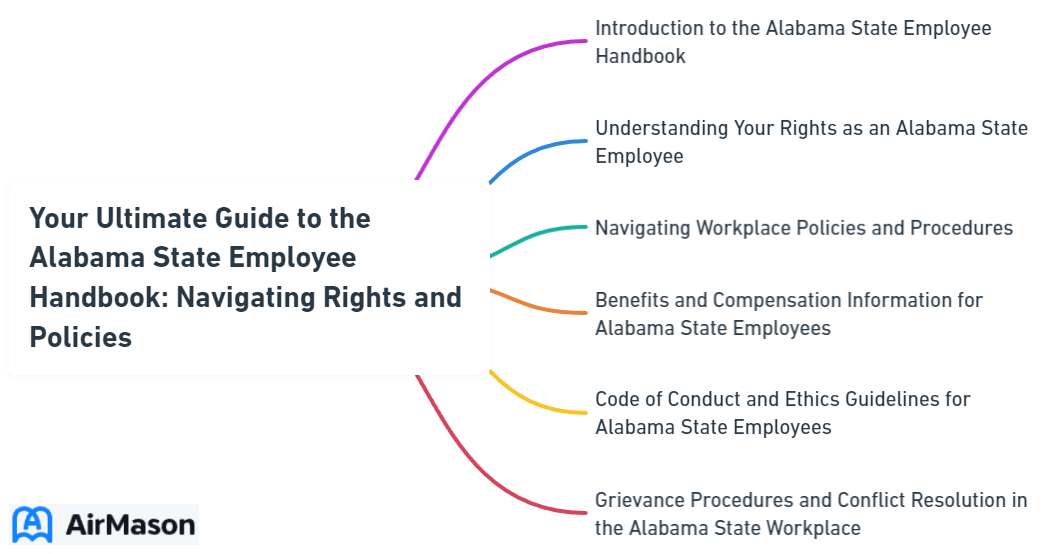
Looking for details on your employment policies as an Alabama state employee? The Alabama State Employee Handbook is a critical document detailing mandatory and optional policies, rights, and practices within the Alabama state employment framework. In this article, we will dissect the imperative elements of the handbook, ensuring you grasp the essentials to effectively navigate your rights and responsibilities in the workplace.
Key Takeaways
- The Alabama State Employee Handbook serves as a comprehensive guide for employees on state-specific laws and company policies, setting clear expectations for behavior and aiding in legal compliance for employers.
- Mandatory policies on state and federal levels must be included in Alabama employee handbooks to ensure legal compliance, while optional policies give employers the flexibility to align with their company’s culture and values.
- Regular updates to Alabama employee handbooks are critical to maintain legal compliance and address changes in laws, and employers must avoid creating unintended contractual obligations through careful drafting, as highlighted by the Davis v. City of Montevallo court ruling.
Employee Handbook Sign-off
The Employee Handbook Sign-off serves as a crucial acknowledgment of an employee’s understanding and agreement with the policies outlined in the handbook. This formal process ensures that each employee is aware of the company’s expectations, rules, and regulations, fostering a cohesive and compliant work environment. By signing off on the handbook, employees affirm their commitment to adhering to company guidelines, promoting professionalism, and upholding company values. Moreover, it provides a documented record of the employee’s acknowledgment, which can be referred back to in case of any disputes or misunderstandings. Regular updates and reviews of the handbook ensure that employees stay informed about any changes or additions to company policies, maintaining alignment with evolving organizational standards. Ultimately, the Employee Handbook Sign-off not only establishes clarity and accountability but also contributes to a harmonious and productive workplace culture.
Understanding Alabama State Employee Handbook

A well-functioning company views the employee handbook as a critical component. It streamlines the onboarding process for new hires, documents required policies, and sets clear expectations for employee behavior. Specifically, in the context of Alabama, an employee handbook serves as a conduit of information, elucidating state-specific policies and rights that employees are entitled to.
This document isn’t just an information booklet but a compass, guiding employees as they navigate the workplace. It’s a standard bearer, ensuring that everyone – from the newest recruit to the seasoned veteran – understands the company’s culture, expectations, and the rules of engagement.
Purpose of the Handbook
Harmony within the workplace is often ensured through the effective use of the employee handbook. It establishes a consistent approach to workplace policies, helping prevent misunderstandings and conflicts. By setting clear expectations on behavior and performance, the handbook aids in resolving workplace issues swiftly and effectively.
The handbook serves multiple purposes:
- It is a rule book, outlining the company’s policies and procedures.
- It is a company biography, offering an introduction to the company’s culture and practices.
- It is a guard, ensuring compliance with state and federal laws and protecting the company from potential legal repercussions.

Importance for Employers and Employees
Far from being a document gathering dust on a shelf, the employee handbook holds significant importance. It plays a crucial role for both employers and employees. For employers, a well-crafted employee handbook offers legal protection by establishing clear policies in accordance with state and federal laws. It serves as an emblem of the employer’s commitment to their employees, including important information such as paid time off, anti-discrimination policies, and workers’ compensation.
For employees, the handbook is a beacon, illuminating the path to a safe and inclusive work environment. By outlining state-specific laws and company-specific policies, it ensures that employees do not feel like sailors lost at sea but empowered individuals who understand their rights and responsibilities.
Required Policies in Alabama Employee Handbooks

Certain non-negotiable policies must be included in the employee handbook, even though it can be tailored to reflect a company’s unique culture and values. To ensure legal compliance, Alabama employee handbooks must contain both state-specific and federal policies.
These mandatory policies are more than just a list of rules. They’re a promise, ensuring that employees are well-informed about the rights and protections offered to them by the state of Alabama. Whether it’s about time off for voting or rules for volunteer firefighters, these policies are a pledge to safeguard employee interests.
State-Specific Policies
Every state has its unique set of employment laws, and Alabama is no exception. The state mandates eight specific policies that must be included in every employee handbook. These policies include:
- Crime Victim Leave
- Jury Duty Leave
- Military Service Leave
- Volunteer Firefighter and Emergency Medical Service Leave
Make sure to include these policies in your employee handbook to ensure compliance with Alabama employment laws.
In addition, Alabama requires businesses with over 25 employees to implement an Election Official Leave policy. And if your company employs minors, don’t forget to include the Meal and Rest Breaks policy. These policies ensure that Alabama’s diverse workforce is protected and supported in various circumstances.
Federal Policies
While state-specific policies cater to local needs, federal policies ensure uniformity across multiple states, including Alabama. These policies cover a broad spectrum, from anti-discrimination and equal employment to family medical leave and sexual harassment.
Including these federal policies in your employee handbook not only ensures compliance with federal law but also demonstrates your commitment to creating a fair, inclusive, and supportive workplace when hiring employees. They serve as a reminder that no matter where you are in the United States, certain rights and protections apply universally.
Optional Policies for Alabama Employee Handbooks

In addition to the necessary policies, the employee handbook may also contain optional policies that employers choose to incorporate. These optional policies, as long as they do not violate NLRA protected employee rights, allow employers to customize their handbooks to reflect their unique organizational culture.
Incorporating optional policies is like painting on a blank canvas. It gives employers the opportunity to tailor their handbook to their unique needs and values while ensuring compliance with the NLRA. However, these policies should be incorporated with caution, ensuring they do not infringe on employee rights under Section 7 of the NLRA.
Benefits of Including Optional Policies
Optional policies are more than just additional rules. They’re a strategic tool that can enhance the company culture, attract potential employees, and contribute to a more productive work environment. They serve as a mirror, reflecting the company’s mission, vision, and values, helping align employees with the unique company culture.
Especially for small businesses, where the impacts of culture are more pronounced, having a strong company culture articulated through optional policies can be critical. Whether it’s addressing work-life balance, improving communication, or demonstrating leadership’s respect for personal life, optional policies can have far-reaching impacts, contributing to overall employee satisfaction and productivity.
Examples of Optional Policies
When it comes to optional policies, the possibilities are extensive. Some examples of optional policies that employers can consider include other policies such as:
- Flexible work arrangements
- Communication policies
- Dress codes
- Gifts and favors policies
These are just a few examples, but there are many other optional policies that employers can implement based on their specific needs and company culture.
Each of these policies has its unique benefits. For instance, flexible work arrangements can enhance work-life balance, while a gifts and favors policy can prevent potential conflicts of interest. Moreover, aligning these optional policies with the company’s culture can significantly enhance employee happiness, demonstrating how such policies can extend beyond their immediate practical benefits.
SHRM Employee Handbook
The SHRM Employee Handbook serves as a comprehensive guide for employees, outlining company policies, procedures, and expectations. It provides essential information regarding employee rights, benefits, and workplace conduct. SHRM, the Society for Human Resource Management, offers this handbook as a valuable resource for both employers and employees to ensure clarity and consistency in workplace practices. From outlining leave policies to addressing disciplinary procedures, the SHRM Employee Handbook plays a vital role in promoting transparency and fairness within organizations. With its detailed guidelines and best practices, employees can refer to the handbook to understand their rights and responsibilities, fostering a positive and productive work environment.
Creating a Compliant Alabama Employee Handbook

The process of creating a compliant Alabama employee handbook requires meticulous attention to detail. It requires careful research, customization, and regular updates to ensure legal compliance and alignment with company culture and values. While it’s not mandated for employers to distribute handbooks in Alabama, they must comply with state-specific and federal employment laws, commonly documented in handbooks.
The stakes are high. Fail to comply, and the company can face significant legal risks. But get it right, and you have a powerful tool that not only reflects your company culture and values but also fosters a positive workplace environment.
Researching and Understanding Legal Requirements
When constructing an Alabama State Employee Handbook, understanding the legal landscape is a must. It’s important to ensure that the handbook adheres to specific state and federal employment laws to mitigate legal risks. This involves carefully crafting workplace policies and procedures that are legally sound and can defend a business from legal issues that may arise from workplace conflicts.
The language used in the handbook, including written policies, must be chosen carefully to adhere to legal requirements and avoid significant legal risks. By adopting optional policies, employers can proactively address potential workplace conflicts, clarifying expectations, and reducing legal headaches.
Customizing the Handbook for Your Company
Every company is unique, and your employee handbook should reflect that. Customizing your handbook involves:
- Reflecting your company’s unique culture, mission, and values
- Incorporating relevant optional policies
- Including your company’s backstory or commitment to work-life balance
Every detail matters.
Customization also involves considering factors unique to your company, such as:
- size
- industry
- relevance of remote work policies
- unique aspects like a ‘Pets in the Workplace Policy’
It’s about crafting a handbook that not only adheres to legal requirements but also resonates with your employees, aiding in creating a cohesive work environment.
Navigating Workplace Issues with the Alabama Employee Handbook
The employee handbook serves a purpose beyond merely guiding company policies. It is a tool that can be used to navigate a variety of workplace issues. Whether it’s a dispute over leave or a question about company culture, the handbook can provide a clear and consistent framework for resolution.
Moreover, the handbook plays a significant role in fostering a stronger, more positive company culture where policies are clearly defined and consistently implemented. By acknowledging that they have reviewed the handbook, employees signal their agreement to follow the outlined policies, which is crucial for maintaining a harmonious work environment.
Using the Handbook as a Reference
Staff and HR teams alike find the employee handbook a handy reference. It provides a clear framework for enforcing policies and addressing workplace issues effectively. Whether it’s defining the use of company devices or outlining the complaint-resolution process, the handbook provides clear guidelines that reflect the employer’s responsiveness to employee interests.
Providing proper training for supervisors on handbook policies, as well as thorough communication of the handbook and its updates to all employees, is vital for the handbook to be an effective reference tool in addressing workplace concerns. It’s about ensuring that everyone is on the same page, leading to a more harmonious, productive, and legally compliant workplace.
Updating the Handbook Regularly
Similar to any good reference tool, staying current is essential for an employee handbook. This means regular updates to reflect changes in federal, state, and local laws, thereby maintaining its effectiveness in addressing workplace issues. Whether it’s a change in leave policies or a new law on workplace harassment, keeping your handbook updated ensures that it remains relevant and legally compliant.
Regular reviews and updates, preferably annually, are crucial to keeping the handbook up-to-date. After all, an outdated handbook can lead to legal liability under the National Labor Relations Act (NLRA). It’s about staying informed, staying compliant, and most importantly, ensuring that your handbook remains a reliable tool for navigating workplace issues.
Legal Implications of Employee Handbooks in Alabama

The Alabama State Employee Handbook serves more than just an informative purpose. It has legal weight. The Alabama Supreme Court ruling in Davis v. City of Montevallo has highlighted the potential for employee handbooks to create contractual obligations, impacting their legal status.
The court’s ruling has transformed the landscape of employment law in Alabama. It has set a precedent that even with disclaimers, if a handbook contains specific language that can be construed as an offer of contract, it can create enforceable obligations. This has significant implications for employers, impacting how they draft and revise their employee handbooks.
Alabama Supreme Court Ruling
In the Davis v. City of Montevallo case, the Alabama Supreme Court held that an employee handbook can create contractual obligations if it contains mandatory language, even with disclaimers. The use of ‘shall’ in an employee handbook, for example, signifies mandatory procedures that the employer intends to be binding, potentially leading to enforceable contractual obligations.
Despite a disclaimer, the court found that the handbook created a unilateral contract that specified the conditions under which an employee could be terminated. Even provisions for making unilateral changes to the handbook were deemed insufficient to bypass the outlined discharge procedures, thus maintaining the handbook’s contractual enforceability.
Implications for Employers
The implications of the court ruling for employers are profound. Employers must ensure that their employee handbooks contain clear, broad no-contract disclaimers to prevent the creation of enforceable contracts. A poorly drafted employee handbook can lead to unexpected contractual obligations and potential breach of contract claims.
To avoid such pitfalls, employers are advised to use plain, unambiguous language and explicitly state their right to deviate from the policies when necessary. It’s about striking a balance between creating a comprehensive guide for employees and avoiding unintended legal consequences.
T Mobile Employee Handbook PDF
Looking for the T Mobile employee handbook PDF format? You’re in luck! T Mobile provides its employees with a comprehensive handbook outlining company policies, procedures, and guidelines. This valuable resource covers everything from employee benefits and code of conduct to workplace expectations and company culture. Whether you’re a new hire or a seasoned employee, having access to the T Mobile employee handbook in PDF format ensures that you have all the information you need at your fingertips. Simply download the PDF file and refer to it whenever you have questions or need clarification on company policies.
Summary
In the evolving landscape of employment law, the Alabama State Employee Handbook serves as a vital guide, a bridge connecting employers and employees, and a beacon illuminating the path to a harmonious and legally compliant workplace. Whether it’s understanding the legal requirements, customizing policies to reflect unique company culture, or addressing workplace issues, the handbook is a tool of great significance. As we navigate the future of work, let the handbook be our compass, guiding us towards a workplace where rights are respected, policies are clear, and everyone is on the same page.
Frequently Asked Questions
Is alabama an at will state?
Yes, Alabama is an at-will state, which means that employers have the right to dismiss an employee without providing a reason in most cases.
What is the purpose of the Alabama State Employee Handbook?
The purpose of the Alabama State Employee Handbook is to serve as a guide to company policies, set clear expectations for employees, and ensure compliance with state-specific and federal laws.
What are some of the mandatory policies in the Alabama State Employee Handbook?
The Alabama State Employee Handbook includes state-specific policies such as Crime Victim Leave, Jury Duty Leave, and Military Service Leave, as well as federal policies like ADA, Equal Employment, and FMLA policies. These are some of the mandatory policies outlined in the handbook.
Can the Alabama State Employee Handbook include optional policies?
Yes, the Alabama State Employee Handbook can include optional policies as long as they do not violate employee rights under the NLRA.
What are the legal implications of the Alabama State Employee Handbook?
The Alabama State Employee Handbook can create contractual obligations if it contains specific language that can be construed as an offer of a contract, as ruled by the Alabama Supreme Court in Davis v. City of Montevallo. It’s important to carefully review the handbook for any language that could establish a contractual agreement.
Important Disclaimer:
Please be aware that the content on this page has been generated by using artificial intelligence language models and may contain errors, inconsistencies, or outdated information. It is provided as-is without any warranties or guarantees of accuracy.
We strongly recommend using this content as a starting point for further research. We disclaim any liability for damages or losses resulting from the use or reliance on this content.